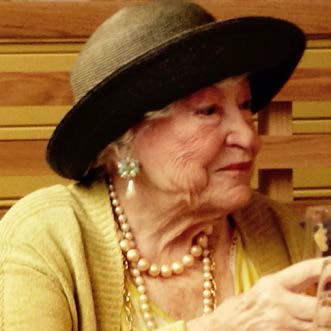
Olga Sorokin-Vasiliev
Lecturer in Russian
Olga Sorokin-Vasiliev, an alumna of the University of California, Berkeley’s Department of Slavic Languages and Literatures, taught Russian language to generations of students at Berkeley for more than 20 years, retiring in 1983. When she died on January 10, 2016, in Calistoga, California, she was a few months shy of 100 years of age.
Born in Tartu, Estonia (then, a part of the Russian Empire), in 1916 in a Russian- Estonian family, Olga Sorokin-Vasiliev (Ольга Николаевна Сорокина-Васильева, née Громова) grew up speaking Russian, Estonian and German. She later mastered French and English. She was educated at Tartu University in Estonia, graduating in 1942 with a degree in Slavic Philology. She and her husband Yuri Alekseevich Sorokin (1915-1969) fled west in face of the advancing Red Army at the end of World War II. In Germany as a displaced person, she taught all subjects and acted as a principal in the Estonian Grammar School at the IRO (International Refugee Organization) refugee camp in Mühldorf and then taught Russian at the European Command U.S. Military School in Oberammergau, before emigrating to the U.S. in 1951. She became a U.S. citizen in 1957.
She taught Russian in the U.S. Army Language School (later, Defense Language Institute) in Monterey, California, until 1959, when she enrolled in the Ph.D. program in the Department of Slavic Languages and Literatures at UC Berkeley. She started teaching Russian as a graduate student instructor there, where her husband Yuri also studied and taught before going on to start the Russian program at San Francisco State University.
She completed her Ph.D. in 1965, with the dissertation on the remarkable and long neglected writer, Ivan Shmelyov [Shmelev], much of whose writings were written and published in emigration (“Ivan Shmelev: His Life and Work”). It was directed by the eminent scholar of Russian literature, Gleb Petrovich Struve. Reworked into a book, her study was published as Moscoviana: The Life and Art of Ivan Shmelyov (Oakland, 1987). It found a new life in Russia, after the end of the Soviet regime, twice published in Russian: Olga Sorokin, Moskoviana: zhiznʹ i tvorchestvo Ivana Shmeleva (Moskva, 1994; 2000). The book includes unique archival documents that were not known to readers in Russia. A dedicated student and proselytizer of Russian émigré literature, Olga Sorokin-Vasiliev also published a number of articles, reviews and translations, including The Hidden Face and Other Stories by Ivan Shmelyov (1991), translated, with an introduction, by Olga Sorokin (Oakland, California, 1991).
Before his death, in 1950 in Paris, Shmelyov had said: “I know the time will come when Russia will welcome me.” Olga Sorokin-Vasiliev did much to make this happen.
Olga Sorokin-Vasiliev was preceded in death by her second husband, Vyacheslav D. Vasiliev.
May her memory live on in her scholarship and publications, and in her students.
Olga Raevsky Hughes
Robert P. Hughes
Eric Naiman
Irina Paperno
2017
